20 have author last names that start with J have author last names that start with J

The familiar history of jazz music in the United States begins with its birth in New Orleans, moves upstream along the Mississippi River to Chicago, then by rail into New York before exploding across the globe. That telling of history, however, overlooks the pivotal role the nation's capital has played for jazz for a century. Some of the most important clubs in the jazz world have opened and closed their doors in Washington, DC, some of its greatest players and promoters were born there and continue to reside in the area, and some of the institutions so critical to national support of this uniquely American form of music, including Congress, the Smithsonian Institution, the Kennedy Center, the Library of Congress and the Historical Society of Washington, D.C., are rooted in the city. Closer to the ground, a network of local schools like the Duke Ellington High School for the Performing Arts, jazz programs at the University of the District of Columbia and Howard University, churches, informal associations, locally focused media, and clubs keeps the music alive to this day.
Noted historians Maurice Jackson and Blair Ruble, editors of this book, present a collection of original and fascinating stories about the DC jazz scene throughout its history, including a portrait of the cultural hotbed of Seventh and U Streets, the role of jazz in desegregating the city, a portrait of the great Edward "Duke" Ellington’s time in DC, notable women in DC jazz, and the seminal contributions of the University of District of Columbia and Howard University to the scene. The book also includes three jazz poems by celebrated Washington, DC, poet E. Ethelbert Miller. Collectively, these stories and poems underscore the deep connection between creativity and place. A copublishing initiative with the Historical Society of Washington, DC, the book includes over thirty museum-quality photographs and a guide to resources for learning more about DC jazz.

In this original study, Jonathan Jacobs provides a new account of ethical realism that combines both abstract meta-ethical issues defining the debate on realism and concrete topics in moral psychology. Jacobs argues that practical reasoners can both understand the ethical significance of facts and be motivated to act by that understanding. In that sense, objective considerations are prescriptive. In his discussion of the theory of practical realism, he extends themes and claims originating in Aristotelian ethics while engaging with the most important contemporary literature.
Arguing that desire and reason can agree on what is good, Jacobs explains how good action is naturally pleasing to the agent. In acting well, the agent affirms certain values and enjoys doing so. Jacobs grounds his explanation of ethical value in detailed explorations of the moral psychology of self-love, friendship, and respect. Students and scholars of philosophy will be intrigued by this integrated account of meta-ethics, practical reason, and moral psychology.

One of the keys to learning the Turkish language is to understand the importance and function of the verb. The stem of the verb, together with various suffixes of mode, tense, person, along with a subject and/or object, may be the equivalent of an entire English sentence. A Dictionary of Turkish Verbs is an aid to both the beginning and more advanced student of the language by providing approximately 1,000 verbs in context as they appear in up-to-date colloquial Turkish phrases and sentences, or short dialogues in translation.
Contrasting English and Turkish ways of expression, this multipurpose dictionary also helps the English speaker avoid the most common errors—with most verbs cross-referenced to related verbs, synonyms, or antonyms, and to the broader themes or categories of meaning to which they belong. Includes an English-Turkish index and a thesaurus section (using Roget's categories) where verbs of related meaning appear together and a short reference list of verb-forming suffixes. For students at any stage of learning the Turkish language, or for the self-motivated traveler, this unique dictionary will help open the door to greater understanding in an increasingly important area of the world.

Russia has deployed cyber operations to interfere in foreign elections, launch disinformation campaigns, and cripple neighboring states—all while maintaining a thin veneer of deniability and avoiding strikes that cross the line into acts of war. How should a targeted nation respond? In Russian Cyber Operations, Scott Jasper dives into the legal and technical maneuvers of Russian cyber strategies, proposing that nations develop solutions for resilience to withstand future attacks.
Jasper examines the place of cyber operations within Russia’s asymmetric arsenal and its use of hybrid and information warfare, considering examples from French and US presidential elections and the 2017 NotPetya mock ransomware attack, among others. A new preface to the paperback edition puts events since 2020 into context. Jasper shows that the international effort to counter these operations through sanctions and indictments has done little to alter Moscow’s behavior. Jasper instead proposes that nations use data correlation technologies in an integrated security platform to establish a more resilient defense.
Russian Cyber Operations provides a critical framework for determining whether Russian cyber campaigns and incidents rise to the level of armed conflict or operate at a lower level as a component of competition. Jasper’s work offers the national security community a robust plan of action critical to effectively mounting a durable defense against Russian cyber campaigns.
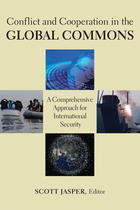
More than ever, international security and economic prosperity depend upon safe access to the shared domains that make up the global commons: maritime, air, space, and cyberspace. Together these domains serve as essential conduits through which international commerce, communication, and governance prosper. However, the global commons are congested, contested, and competitive. In the January 2012 defense strategic guidance, the United States confirmed its commitment “to continue to lead global efforts with capable allies and partners to assure access to and use of the global commons, both by strengthening international norms of responsible behavior and by maintaining relevant and interoperable military capabilities.”
In the face of persistent threats, some hybrid in nature, and their consequences, Conflict and Cooperation in the Global Commons provides a forum where contributors identify ways to strengthen and maintain responsible use of the global commons. The result is a comprehensive approach that will enhance, align, and unify commercial industry, civil agency, and military perspectives and actions.
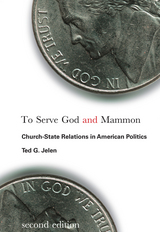
Newly revised and updated, To Serve God and Mammon is a classic in the field of religion and politics that provides an unbiased introduction and overview of church–state relations in the United States.
Jelen begins by exploring the inherent tension between the Establishment and Free Exercise clauses of the First Amendment. He then examines how different actors in American politics (e.g., the courts, Congress, the president, ordinary citizens) have different and conflicting values that affect their attitudes and actions toward the relationship between the sacred and the secular. Finally, he discusses how the fragmented nature of political authority in the United States provides the basis for continuing conflict concerning church–state relations.
This second edition includes analyses of various recent court cases and the implications of living in the post–9/11 era. It also features discussion questions at the end of each chapter, a glossary of terms, and synopses of selected court decisions bearing on religion and politics in the United States.

The Future of Ethics interprets the big questions of sustainability and social justice through the practical problems arising from humanity’s increasing power over basic systems of life. What does climate change mean for our obligations to future generations? How can the sciences work with pluralist cultures in ways that will help societies learn from ecological change?
Traditional religious ethics examines texts and traditions and highlights principles and virtuous behaviors that can apply to particular issues. Willis Jenkins develops lines of practical inquiry through "prophetic pragmatism," an approach to ethics that begins with concrete problems and adapts to changing circumstances. This brand of pragmatism takes its cues from liberationist theology, with its emphasis on how individuals and communities actually cope with overwhelming problems.
Can religious communities make a difference when dealing with these issues? By integrating environmental sciences and theological ethics into problem-based engagements with philosophy, economics, and other disciplines, Jenkins illustrates the wide understanding and moral creativity needed to live well in the new conditions of human power. He shows the significance of religious thought to the development of interdisciplinary responses to sustainability issues and how this calls for a new style of religious ethics.

All manner of medical practitioners have had their scruples dissected ad infinitum. In spite of the attention paid to medical ethics and bioethics, little has been paid to the ethical roles and responsibilities of those who are ultimately in charge of hospital governance: hospital trustees.
Deriving from a Hastings Center research project involving meetings with a national task force of experts and extensive interviews with 98 nonprofit hospital trustees and CEOs over a two-year period, The Ethics of Hospital Trustees shows that the decisions made by these often overlooked members of the health community do raise important ethical issues, and that ethical dimensions of trustee service should be more explicitly recognized and discussed.
Practical as well as theoretical, The Ethics of Hospital Trustees uncovers four basic principles: 1. Fidelity to mission; 2. Service to patients; 3. Service to the community; and 4. Institutional stewardship. In delineating the extremely important functions of hospital trustees, from patient safety to financial responsibility, the contributors outline not only how hospital trustees do perform—they give a fresh understanding to how they should perform as well.

An in-depth assessment of innovations in military information technology informs hypothetical outcomes for artificial intelligence adaptations
In the coming decades, artificial intelligence (AI) could revolutionize the way humans wage war. The military organizations that best innovate and adapt to this AI revolution will likely gain significant advantages over their rivals. To this end, great powers such as the United States, China, and Russia are already investing in novel sensing, reasoning, and learning technologies that will alter how militaries plan and fight. The resulting transformation could fundamentally change the character of war.
In Information in War, Benjamin Jensen, Christopher Whyte, and Scott Cuomo provide a deeper understanding of the AI revolution by exploring the relationship between information, organizational dynamics, and military power. The authors analyze how militaries adjust to new information communication technology historically to identify opportunities, risks, and obstacles that will almost certainly confront modern defense organizations as they pursue AI pathways to the future. Information in War builds on these historical cases to frame four alternative future scenarios exploring what the AI revolution could look like in the US military by 2040.

In the mid-1990s, when the United Nations adopted positions affirming a woman's right to be free from bodily harm and to control her own reproductive health, it was both a coup for the international women's rights movement and an instructive moment for nongovernmental organizations (NGOs) seeking to influence UN decision making.
Prior to the UN General Assembly's 1993 Declaration on the Elimination of All Forms of Violence against Women and the 1994 decision by the UN's Conference on Population and Development to vault women's reproductive rights and health to the forefront of its global population growth management program, there was little consensus among governments as to what constituted violence against women and how much control a woman should have over reproduction. Jutta Joachim tells the story of how, in the years leading up to these decisions, women's organizations got savvy—framing the issues strategically, seizing political opportunities in the international environment, and taking advantage of mobilizing structures—and overcame the cultural opposition of many UN-member states to broadly define the two issues and ultimately cement women's rights as an international cause.
Joachim's deft examination of the documents, proceedings, and actions of the UN and women's advocacy NGOs—supplemented by interviews with key players from concerned parties, and her own participant-observation—reveals flaws in state-centered international relations theories as applied to UN policy, details the tactics and methods that NGOs can employ in order to push rights issues onto the UN agenda, and offers insights into the factors that affect NGO influence. In so doing, Agenda Setting, the UN, and NGOs departs from conventional international relations theory by drawing on social movement literature to illustrate how rights groups can motivate change at the international level.
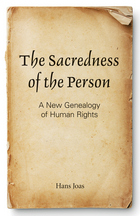
What are the origins of the idea of human rights and universal human dignity? How can we most fully understand—and realize—these rights going into the future? In The Sacredness of the Person, internationally renowned sociologist and social theorist Hans Joas tells a story that differs from conventional narratives by tracing the concept of human rights back to the Judeo-Christian tradition or, alternately, to the secular French Enlightenment. While drawing on sociologists such as Émile Durkheim, Max Weber, and Ernst Troeltsch, Joas sets out a new path, proposing an affirmative genealogy in which human rights are the result of a process of “sacralization” of every human being.
According to Joas, every single human being has increasingly been viewed as sacred. He discusses the abolition of torture and slavery, once common practice in the pre-18th century west, as two milestones in modern human history. The author concludes by portraying the emergence of the UN Declaration of Human Rights of 1948 as a successful process of value generalization. Joas demonstrates that the history of human rights cannot adequately be described as a history of ideas or as legal history, but as a complex transformation in which diverse cultural traditions had to be articulated, legally codified, and assimilated into practices of everyday life. The sacralization of the person and universal human rights will only be secure in the future, warns Joas, through continued support by institutions and society, vigorous discourse in their defense, and their incarnation in everyday life and practice.
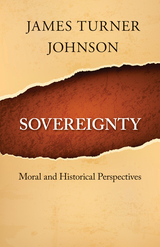
Sovereignty generally refers to a particular national territory, the inviolability of the nation’s borders, and the right of that nation to protect its borders and ensure internal stability. From the Middle Ages until well into the Modern Period, however, another concept of sovereignty held sway: responsibility for the common good. James Turner Johnson argues that these two conceptions—sovereignty as self-defense and sovereignty as acting on behalf of the common good—are in conflict and suggests that international bodies must acknowledge this tension.
Johnson explores this earlier concept of sovereignty as moral responsibility in its historical development and expands the concept to the current idea of the Responsibility to Protect. He explores the use of military force in contemporary conflicts, includes a review of radical Islam, and provides a corrective to the idea of sovereignty as territorial integrity in the context of questions regarding humanitarian intervention. Johnson’s new synthesis of sovereignty deepens the possibilities for cross-cultural dialogue on the goods of politics and the use of military force.

The United States Marine Corps has a unique culture that ensures comradery, exacting standards, and readiness to be the first to every fight. Yet even in a group that is known for innovation, culture can push leaders to fall back on ingrained preferences. Jeannie L. Johnson takes a sympathetic but critical look at the Marine Corps's long experience with counterinsurgency warfare. Which counterinsurgency lessons have been learned and retained for next time and which have been abandoned to history is a story of battlefield trial and error—but also a story of cultural collisions.
The book begins with a fascinating and penetrating look inside the culture of the Marine Corps through research in primary sources, including Marine oral histories, and interviews with Marines. Johnson explores what makes this branch of the military distinct: their identity, norms, values, and perceptual lens. She then traces the history of the Marines' counterinsurgency experience from the expeditionary missions of the early twentieth century, through the Vietnam War, and finally to the Iraq War. Her findings break new ground in strategic culture by introducing a methodology that was pioneered in the intelligence community to forecast behavior. Johnson shows that even a service as self-aware and dedicated to innovation as the Marine Corps is constrained in the lessons-learned process by its own internal predispositions, by the wider US military culture, and by national preferences. Her findings challenge the conclusions of previous counterinsurgency scholarship that ignores culture. This highly readable book reminds us of Sun Tzu's wisdom that to be successful in war, it is important to know thyself as well as the enemy. This is a must-read for anyone interested in the Marines Corps, counterinsurgency warfare, military innovation, or strategic culture.

A Black-Jewish dialogue lifts a veil on these groups’ unspoken history, shedding light on the challenges and promises facing American democracy from its inception to the present
In this uniquely structured conversational work, two scholars—one of African American politics and religion, and one of contemporary American Jewish culture—explore a mystery: Why aren't Blacks and Jews presently united in their efforts to combat white supremacy? As alt-right rhetoric becomes increasingly normalized in public life, the time seems right for these one-time allies to rekindle the fires of the civil rights movement.
Blacks and Jews in America investigates why these two groups do not presently see each other as sharing a common enemy, let alone a political alliance. Authors Terrence L. Johnson and Jacques Berlinerblau consider a number of angles, including the disintegration of the “Grand Alliance” between Blacks and Jews during the civil rights era, the perspective of Black and Jewish millennials, the debate over Louis Farrakhan and the Nation of Islam, and the Israel-Palestine conflict.
Ultimately, this book shows how the deep roots of the Black-Jewish relationship began long before the mid-twentieth century, changing a narrative dominated by the Grand Alliance and its subsequent fracturing. By engaging this history from our country’s origins to its present moment, this dialogue models the honest and searching conversation needed for Blacks and Jews to forge a new understanding.

A Classic in Counterintelligence—Now Back in Print
Originally published in 1987, Thwarting Enemies at Home and Abroad is a unique primer that teaches the principles, strategy, and tradecraft of counterintelligence (CI). CI is often misunderstood and narrowly equated with security and catching spies, which are only part of the picture. As William R. Johnson explains, CI is the art of actively protecting secrets but also aggressively thwarting, penetrating, and deceiving hostile intelligence organizations to neutralize or even manipulate their operations.
Johnson, a career CIA intelligence officer, lucidly presents the nuts and bolts of the business of counterintelligence and the characteristics that make a good CI officer. Although written during the late Cold War, this book continues to be useful for intelligence professionals, scholars, and students because the basic principles of CI are largely timeless. General readers will enjoy the lively narrative and detailed descriptions of tradecraft that reveal the real world of intelligence and espionage. A new foreword by former CIA officer and noted author William Hood provides a contemporary perspective on this valuable book and its author.
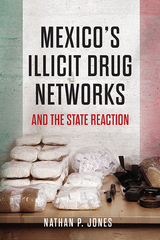
Mexican drug networks are large and violent, engaging in activities like the trafficking of narcotics, money laundering, extortion, kidnapping, and mass murder. Despite the impact of these activities in Mexico and abroad, these illicit networks are remarkably resilient to state intervention.
Drawing on extensive fieldwork and interviews with US and Mexican law enforcement, government officials, organized crime victims, and criminals, Nathan P. Jones examines the comparative resilience of two basic types of drug networks—“territorial” and “transactional”—that are differentiated by their business strategies and provoke wildly different responses from the state. Transactional networks focus on trafficking and are more likely to collude with the state through corruption, while territorial networks that seek to control territory for the purpose of taxation, extortion, and their own security often trigger a strong backlash from the state.
Timely and authoritative, Mexico's Illicit Drug Networks and the State Reaction provides crucial insight into why Mexico targets some drug networks over others, reassesses the impact of the war on drugs, and proposes new solutions for weak states in their battles with drug networks.

Government agencies and commissions, courts, and legislatures have during the past several decades produced reports, rendered decisions, and passed laws that have both defined the fundamental issues in the field of bioethics and established ways of managing them in our society. Providing a history of these key bioethical decisions, this Source Book in Bioethics is the first and only comprehensive collection of the critical public documents in biomedical ethics, including many hard-to-find or out-of-print materials.
Covering the period from 1947 to 1995, this volume brings together core legislative documents, court briefs, and reports by professional organizations, public bodies, and governments around the world. Sections on human experimentation, care of the terminally ill, genetics, human reproduction, and emerging areas in bioethics include such pivotal works as "The Nuremberg Code," "The Tuskegee Report," and "In the Matter of Baby M," as well less readily available documents as "The Declaration of Inuyama," the Council for International Organizations of Medical Sciences statement on genetic engineering, and "The Warnock Committee Report" on reproductive technologies from the United Kingdom. Three eminent scholars in the field provide brief introductions to each document explaining the significance of these classic sources.
This historical volume will be a standard text for courses in bioethics, health policy, and death and dying, and a primary reference for anyone interested in this increasingly relevant field.

India's nuclear profile, doctrine, and practices have evolved rapidly since the country’s nuclear breakout in 1998. However, the outside world's understanding of India's doctrinal debates, forward-looking strategy, and technical developments are still two decades behind the present. India and Nuclear Asia will fill that gap in our knowledge by focusing on the post-1998 evolution of Indian nuclear thought, its arsenal, the triangular rivalry with Pakistan and China, and New Delhi's nonproliferation policy approaches. Yogesh Joshi and Frank O'Donnell show how India's nuclear trajectory has evolved in response to domestic, regional, and global drivers.
The authors argue that emerging trends in all three states are elevating risks of regional inadvertent and accidental escalation. These include the forthcoming launch of naval nuclear forces within an environment of contested maritime boundaries; the growing employment of dual-use delivery vehicles; and the emerging preferences of all three states to employ missiles early in a conflict. These dangers are amplified by the near-absence of substantive nuclear dialogue between these states, and the growing ambiguity of regional strategic intentions.
Based on primary-source research and interviews, this book will be important reading for scholars and students of nuclear deterrence and India's international relations, as well as for military, defense contractor, and policy audiences both within and outside South Asia.
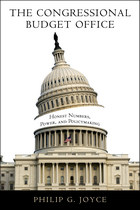
Created in 1974, the U.S. Congressional Budget Office (CBO) has become one of the most influential forces in national policymaking. A critical component of our system of checks and balances, the CBO has given Congress the analytical capacity to challenge the president on budget issues while it protects the public interest, providing honest numbers about Congress's own budget proposals. The book discusses the CBO’s role in larger budget policy and the more narrow "scoring" of individual legislation, such as its role in the 2009–2010 Obama health care reform. It also describes how the first director, Alice Rivlin, and seven successors managed to create and sustain a nonpartisan, highly credible agency in the middle of one of the most partisan institutions imaginable.
The Congressional Budget Office: Honest Numbers, Power, and Policy draws on interviews with high-level participants in the budget debates of the last 35 years to tell the story of the CBO. A combination of political history, economic history, and organizational development, The Congressional Budget Office offers an important, first book-length history of this influential agency.

This book explores the effects of global socio-economic forces on the domestic policies and administrative institutions of Japan and the United States, and it explains how these global factors have shifted power and authority downward from the national government to subnational governments.
This major comparative study comprises ten pairs of essays written by leading Japanese and American scholars on parallel public policy issues, institutional patterns, and intergovernmental relations in Japan and the United States, all set in the context of globalization and its impact on decentralization in each country. The twenty contributors and the editors provide new insights into the domestic consequences of global interdependence by examining emerging strategies for dealing with environmental concerns, urban problems, infrastructure investments, financial policies, and human services issues.
An important study of the changing global setting, Globalization and Decentralization emphasizes the innovative and adaptive roles played by Japanese and American state, provincial, regional, and local governments in responding to the dramatic economic and political power shifts created by the new world order.
READERS
Browse our collection.
PUBLISHERS
See BiblioVault's publisher services.
STUDENT SERVICES
Files for college accessibility offices.
UChicago Accessibility Resources
home | accessibility | search | about | contact us
BiblioVault ® 2001 - 2024
The University of Chicago Press









